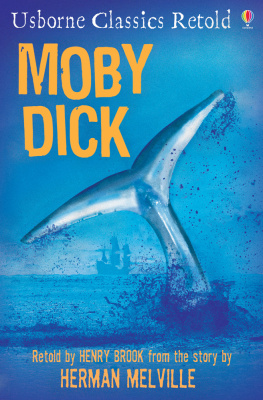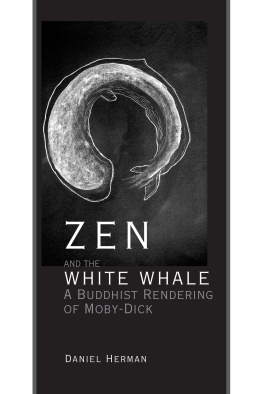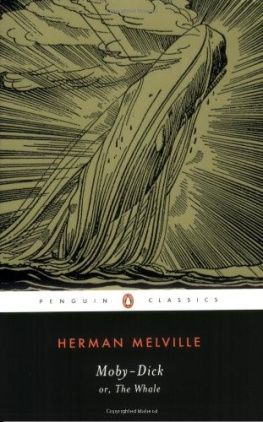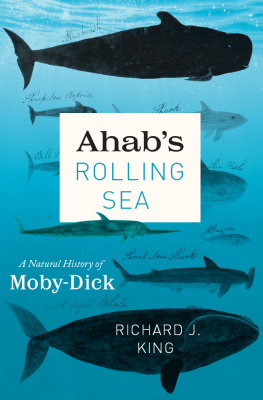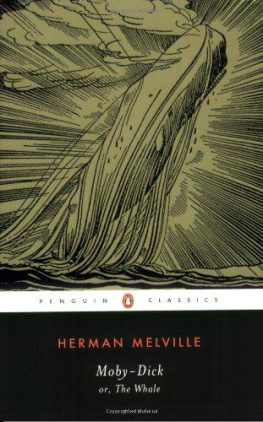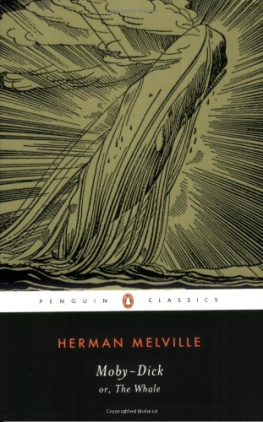Moby-Dick - Sounding the Whale: Moby-Dick as Epic Novel
Here you can read online Moby-Dick - Sounding the Whale: Moby-Dick as Epic Novel full text of the book (entire story) in english for free. Download pdf and epub, get meaning, cover and reviews about this ebook. year: 1996, publisher: The Kent State University Press, genre: Detective and thriller. Description of the work, (preface) as well as reviews are available. Best literature library LitArk.com created for fans of good reading and offers a wide selection of genres:
Romance novel
Science fiction
Adventure
Detective
Science
History
Home and family
Prose
Art
Politics
Computer
Non-fiction
Religion
Business
Children
Humor
Choose a favorite category and find really read worthwhile books. Enjoy immersion in the world of imagination, feel the emotions of the characters or learn something new for yourself, make an fascinating discovery.
- Book:Sounding the Whale: Moby-Dick as Epic Novel
- Author:
- Publisher:The Kent State University Press
- Genre:
- Year:1996
- Rating:4 / 5
- Favourites:Add to favourites
- Your mark:
- 80
- 1
- 2
- 3
- 4
- 5
Sounding the Whale: Moby-Dick as Epic Novel: summary, description and annotation
We offer to read an annotation, description, summary or preface (depends on what the author of the book "Sounding the Whale: Moby-Dick as Epic Novel" wrote himself). If you haven't found the necessary information about the book — write in the comments, we will try to find it.
Moby-Dick: author's other books
Who wrote Sounding the Whale: Moby-Dick as Epic Novel? Find out the surname, the name of the author of the book and a list of all author's works by series.
Sounding the Whale: Moby-Dick as Epic Novel — read online for free the complete book (whole text) full work
Below is the text of the book, divided by pages. System saving the place of the last page read, allows you to conveniently read the book "Sounding the Whale: Moby-Dick as Epic Novel" online for free, without having to search again every time where you left off. Put a bookmark, and you can go to the page where you finished reading at any time.
Font size:
Interval:
Bookmark:

Sounding the
Whale

Moby-Dick
as Epic Novel

Christopher Sten
The Kent State University Press
Kent, Ohio, & London, England
1996 by The Kent State University Press, Kent, Ohio 44242
All rights reserved
Library of Congress Catalog Card Number 96-17392
ISBN 0-87338-560-8
Manufactured in the United States of America
03 02 01 00 99 98 97 96 5 4 3 2 1
Library of Congress Cataloging-in-Publication Data
Sten, Christopher, 1944
Sounding the whale : Moby-Dick as epic novel / Christopher Sten.
p. cm.
Previously published as ch. 6 of The weaver God, he weaves. Kent, Ohio :
Kent State University Press, 1996. With a new introd.
Includes bibliographical references and index.
ISBN 0-87338-560-8 (pbk : alk. paper) 
1. Melville, Herman, 18191891. Moby-Dick. 2. Epic literature, AmericanHistory and criticism. 3. Sea stories, AmericanHistory and criticism. 4. Whaling in literature. 5. Whales in literature. I. Sten, Christopher, 1944. Weaver-God, he weaves. II. Title.
PS2384.M62S69 1996
813.3dc20 96-17392
British Library Cataloging-in-Publication data are available.


As a quest epic, Moby-Dick is Melvilles most ambitious novel, and his most challenging. As such, it requires the most careful and responsive reading imaginable. But care and responsiveness, good Ishmaelian virtues though they are, are likely to take one only so far into the labyrinth of The Whale. For a clear apprehension of the intricacy and depth of Melvilles story, of the rewards and dangers, the subtle ins and outs of the quest, one is likely to need a guide, as Ishmael did when he undertook his first whaling voyage in the company of Queequeg. This book is intended as such a guide.
Originally written as a long chapter in a larger study of Melvilles major fiction, The Weaver-God He Weaves: Melville and the Poetics of the Novel (1996), this essay took the form, almost from the beginning, of a chapter-by-chapter account of my own close encounter with Moby-Dick. And as it grew, I realized I was writing a book within a book that might prove useful in its own right to readers of Melvilles most difficult and perplexing narrative. So far as I know, there is nothing quite like it, no scene-by-scene discussion, anywhere among the shelves of books devoted to this extraordinary novel. Happily, the editors at the Kent State University Press, publishers of The Weaver-God, agreed to the idea of issuing this chapter as a separate volume. The only change in the present volume is a change in title, from Sounding the Self to Sounding the Whale, a modification that permits the essay to stand more squarely on its own and perhaps more clearly points to the organizing idea in Melvilles narrative, namely, that the Whale is Melvilles great symbol for the self, his ingenious image of the soulthe object, as his Transcendentalist contemporaries should have recognized, of all meditation.
To sound has many meanings, but among the many that are relevant in such an endlessly layered book as Moby-Dick, the most important are to celebrate or honor, as Ishmael celebrates the Whale and the honor and glory of whaling; and to measure, to investigate or examine, to try to find out, as Ishmael endlessly measures and investigates the Whales anatomy, probing it in part and in whole, throughout the notorious cetology chapters especially, to make it yield its wealth of meanings. The whole process, we shall see, is coincident with Ishmaels effort to discover his own buried self or soul, to know its treasure house of qualities, natural and supernatural, and to unleash its immense power within himself.
To be sure, no guide goes alone. I have had my own helping spirits in threading my way through the intricacies of Melvilles narrative, most especially C. G. Jung, Joseph Campbell, Northrop Frye, Mircea Eliade, and T. S. Eliot. These seminal thinkers, with their powerful psychological and mythic sensibilities, have helped me to see Melvilles subject as one of spiritual discovery, of awakening to self-knowledge. Others, such as Lascelles Abercrombie, Albert Cook, and John Kevin Newman, not to mention the great epic practitioners themselves, Homer, Dante, and Milton, have helped me to see it in the context of Melvilles predecessors in this most challenging and profound of literary genres.
My approach, ultimately, is based on a theory of genres, and the assumption that no author, no matter how original, creates in a vacuum. Indeed, rather than view genres and narrative conventions as rule-bound schemes that inhibit creativity, I see them, as Tzvetan Todorov, E. D. Hirsch, Hans Robert Jauss, Jonathan Culler, Robert Scholes, Adena Rosmarin, and others have been teaching us to do in recent years, as enabling or making possible the creative process. Generic codes ought not to be regarded simply as classificatory schemes or rule-bound formulae but as communicative codes that make meaning possible and intention discernible. Melvilles critics have long assumed that the author of Moby-Dick was a raw genius who read widely and energetically but lacked patience for, and even knowledge of, traditional forms of narrative. In the following pages I argue that Melville was well versed in such forms and appropriated them to his own highly original purposes, indeed, that in this novel he set out to fuse the heroic qualities of the ancient Homeric epic with the spiritual qualities of the early modern form found in Dante and Milton, all in an unprecedented poetic prosethe first such prose epic of its kind, and the only religious epic on the subject of whaling anyone has ever had the audacity to write.
Among the many people who contributed to the production of this study, going back even to my undergraduate days, I wish to thank especially a luminous professor, Robert Diebold, then of Carleton College; an astute mentor and critic, Terence Martin, of Indiana University; and a most generous and perceptive colleague and friend, James Maddox, of George Washington University, for their inspiration, faith, and counsel. Even before these three, however, there were my venturesome siblings, John and Steph, who led the wayto school, to the water, and beyond. This book is dedicated to them.

Moby-Dick as Epic Novel
At the end of his now famous review, written in the late summer of 1850 while composing Moby-Dick, Melville predicted that Hawthornes Mosses from an Old Manse would one day be regarded as his masterpiece. For, he explained, there is a sure, though a secret sign in some works which prove the culmination of the powers (only the developable ones, however) that produced them. Whether Melville had read any of Hawthornes other works at this time is unclear. Still unacquainted with the man himself, or so he professed, he apparently did not know that Hawthorne had published The Scarlet Letter earlier that same year.
What is remarkable about this rather droll version of Emersonian philosophy is that it captures the same conviction regarding the potency of transcendent powers, the same conception of life, even the same theory of art that Melville was then trying to infuse into his own masterwork. The calling forth of wondrous, occult properties, that rare but happy accident in the life of humankind, is the central subject of Melvilles great story. In its most heightened form, it is also the subject of the worlds great modern epics, particularly spiritual epics, such as the
Next pageFont size:
Interval:
Bookmark:
Similar books «Sounding the Whale: Moby-Dick as Epic Novel»
Look at similar books to Sounding the Whale: Moby-Dick as Epic Novel. We have selected literature similar in name and meaning in the hope of providing readers with more options to find new, interesting, not yet read works.
Discussion, reviews of the book Sounding the Whale: Moby-Dick as Epic Novel and just readers' own opinions. Leave your comments, write what you think about the work, its meaning or the main characters. Specify what exactly you liked and what you didn't like, and why you think so.



